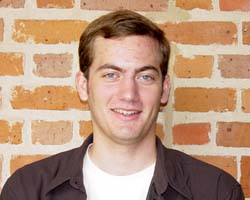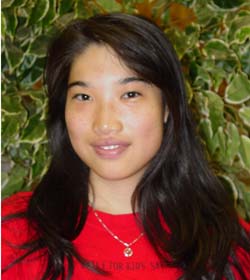The Communication
Factor
Newsletter of the Cain Project in Engineering and Professional
Communication at Rice University Fall-2003
Cain Project Home >> Newsletter
Student Spotlight: Cain Project Mentors & Coaches
Student Presentations
Coaches
In the fall of ’99, the Cain Project trained its first presentations
coaches to mentor the presentations of other students. Science and engineering
students can make appointments with these coaches to get feedback on their
presentations’ delivery, organization and graphics. Currently the
Cain Project has two presentations studios in which practices are held:
one in Abercrombie B109 and the other in Anderson Biology 215. Although
final presentations fall at the end of the semester, a hectic time for
all students, the dedicated coaches take time out of their busy schedules
to help other students prepare for their presentations.
 Sam
Jones, a chemical engineering major in his junior year at Rice, is currently
one of the Cain Project
Sam
Jones, a chemical engineering major in his junior year at Rice, is currently
one of the Cain Project
presentations coaches. Sam’s first involvement with the Cain Project
was as a Rice freshman in UNIV 113: Technological Disasters and Catastrophes.
In this class, groups are required to give presentations analyzing a disaster
or catastrophe such as the Apollo 1 mission. It was in this class that
Cain Project Assistant Director Tracy Volz coached Sam. Because of Tracy’s
coaching, Sam now enjoys public speaking and finds it much less stressful.
He “gets a kick” out of giving presentations.
Currently Sam coaches students in UNIV 113. He is also a TA for Organic
Chemistry 215 where he presents synopses of chapters and works through
old exams for an audience of up to 100 students. He feels that the ability
to speak in front of a group helps students stand out. Although working
with the Cain Project it is not a requirement, Sam says that students
are missing out on a great opportunity if they do not take advantage of
the services it offers.
BIOS 201/202 Student
Writing Mentors
Each year the Cain Project recruits some of the top writers in BIOS 202
to become writing mentors for Introductory Biology. These students are
trained by Cain Project instructors to read, evaluate, grade and review
BIOS 201/202 students’ papers. They are available for one-on-one
consultations with BIOS students to review their assignments and to give
them feedback. This semester, ten mentors worked with over one hundred
students on their assignments and extra-credit papers.
BIOS writing mentor Trevor Crowell is a junior majoring in biology and
history. He is considering  pursuing
a career in international medicine.
pursuing
a career in international medicine.
Trevor was first introduced to the Cain Project when he enrolled in BIOS
202 and received the mentoring that he himself now gives. Trevor has also
taken two other courses sponsored by the Cain Project, ENGL 307: Medical/Technical
Communication and BIOS 305: Writing and Presenting in the Biosciences.
The clarity and persuasiveness of his own writing have greatly improved
as a result. Trevor expects to use many of the skills he has learned from
the Cain Project as a physician, a career in which he will interact with
people on a daily basis. Being able to communicate effectively will aid
him when working with patients, researchers, and other physicians and
professionals.
 Lingo
Lai is a senior psychology student who has been a Cain Project writing
mentor for the past two semesters. She emphasizes the difference between
writing science papers vs. writing humanities papers. Most students entering
college lack experience writing scientific reports. They are rarely taught
how to manage the aspects of style, tone and wording required by this
type of writing. As a mentor, Lingo helps students develop the skills
they need to write well.
Lingo
Lai is a senior psychology student who has been a Cain Project writing
mentor for the past two semesters. She emphasizes the difference between
writing science papers vs. writing humanities papers. Most students entering
college lack experience writing scientific reports. They are rarely taught
how to manage the aspects of style, tone and wording required by this
type of writing. As a mentor, Lingo helps students develop the skills
they need to write well.
Lingo says that her experience working with the Cain Project as a writing
mentor has been rewarding because of the noticeable improvement of the
students’ work within a semester. She likes knowing that the students
actually read the comments she writes on their papers and enjoys feeling
that she’s made a difference in one aspect of their academic careers.
In addition to helping the BIOS students, Lingo finds that mentoring helps
improve her own writing skills. After reading so many papers, she has
developed a “better sense of how information should be presented
and how sentences should be phrased.”
Cain Project
Home
>> Newsletter
![]() Previous Article
Previous Article ![]() Next Article
Next Article